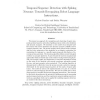71 search results - page 11 / 15 » Unsupervised clustering of robot activities: a Bayesian appr... |
AAAI
2006
13 years 9 months ago
2006
Relationships between concepts account for a large proportion of semantic knowledge. We present a nonparametric Bayesian model that discovers systems of related concepts. Given da...
ICASSP
2009
IEEE
13 years 5 months ago
2009
IEEE
In this paper, a novel non-stationary model of functional Magnetic Resonance Imaging (fMRI) time series is proposed. It allows us to account for some putative habituation effect a...
ISM
2008
IEEE
13 years 7 months ago
2008
IEEE
In an environment where the contexts of users are complex and the degree of freedom of user activity is very high, such as in daily life, several factors need to be considered for...
CONNECTION
2006
13 years 7 months ago
2006
We present an approach for recognition and clustering of spatio temporal patterns based on networks of spiking neurons with active dendrites and dynamic synapses. We introduce a n...
TMI
2010
13 years 2 months ago
2010
Within-subject analysis in fMRI essentially addresses two problems, the detection of brain regions eliciting evoked activity and the estimation of the underlying dynamics. In [1, 2...

